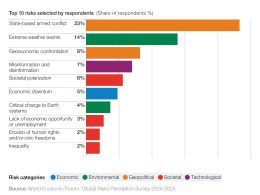According to a recent survey conducted by Gartner, Inc., 69% of CEOs and senior executives see sustainability as a key business growth opportunity in 2024. The 2024 Gartner CEO and Senior Business Executive Survey, conducted from July to December 2023, encompassed over 400 CEOs and senior executives across various regions including North America, Europe, Asia/Pacific, Latin America, the Middle East, and South Africa. The respondents represented diverse industries, revenue levels, and company sizes.
The survey shows that the leading ways CEOs are using sustainability to drive business growth are through sustainable products and services (33%); sustainable business practices (18%); stakeholder engagement (18%); and decarbonization (18%). Digital investments and innovation are ranked ninth at 8%.
“As CEOs reset their long-term strategies, environmental sustainability remains one of the leading factors that will frame competition,” said Kristin Moyer, Distinguished VP Analyst at Gartner. “Despite much corporate greenwash, recent economic conditions could have triggered a reversion to environmental, social and governance (ESG) cynicism and a refocus on profit at all costs. However, the overall commitment of CEOs appears unwavering.”
“Sustainability consistently remains a top 10 business priority, surpassing even productivity and efficiency this year,” said Moyer. “Leaders and investors know environmentally cavalier corporate behavior is a mid to long-term risk to business results, with a big price to be paid when environmental factors are ignored as externalities. However, smart CEOs realize big sustainability challenges create new areas of business opportunity.”
The Gartner survey disclosed that 54% of CEOs acknowledge that their businesses are moderately affected by changing weather patterns. Additionally, over half (51%) of them admit that these changes are prompting or have already prompted them to adjust their operational strategies. Among the impacts highlighted by CEOs, operating dynamics stand out as the most affected area (30%), specifically in terms of logistics adjustments such as warehousing, delivery timing, and routing. Relocations, including nearshoring, rank second (14%), followed closely by considerations around automation, technology, and data (13%).
















